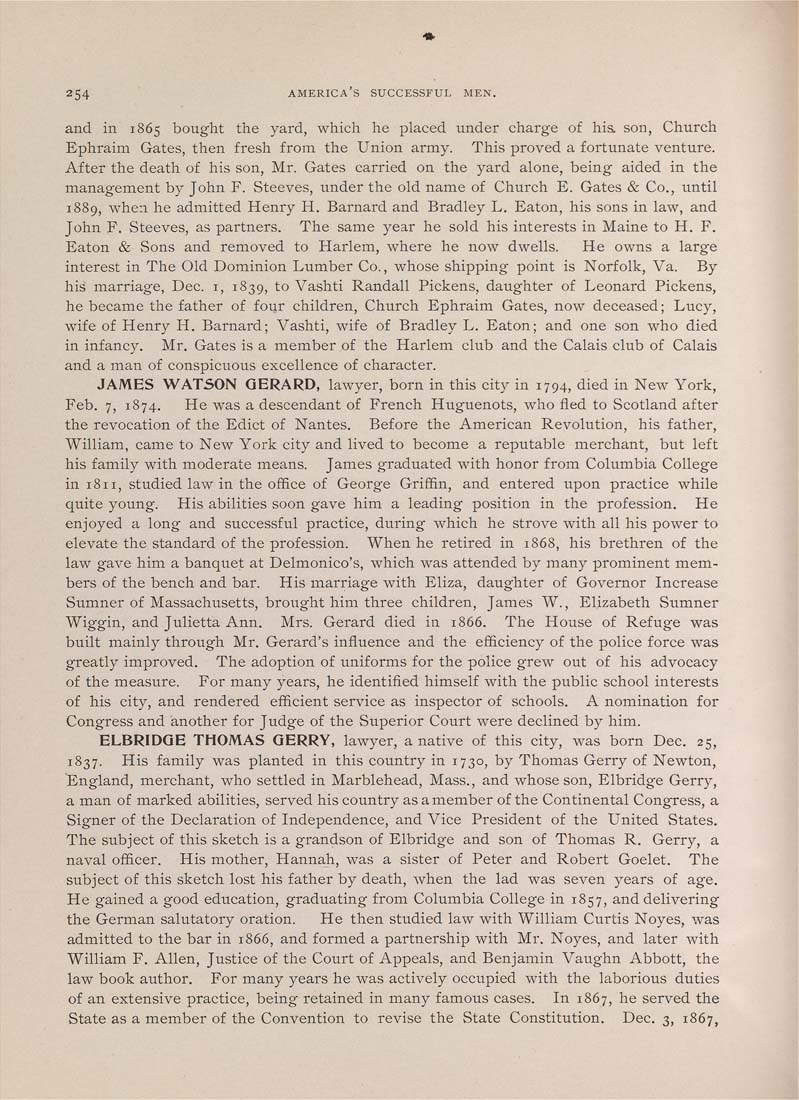254
AMERICA S SUCCESSFUL MEN.
and in 1865 bought the yard, which he placed under charge of hi& son. Church
Ephraim Gates, then fresh from the Union army. This proved a fortunate venture.
After the death of his son, Mr. Gates carried on the yard alone, being aided in the
management by John F. Steeves, under the old name of Church E. Gates & Co., until
), when he admitted Henry H. Barnard and Bradley L. Eaton, his sons in law, and
John P. Steeves, as partners. The same year he sold his interests in Maine to H. F.
Eaton & Sons and removed to Harlem, where he now dwells. He owns a large
interest in The Old Dominion Lumber Co., whose shipping point is Norfolk, Va. By
his marriage, Dec. i, 1839, to Vashti Randall Pickens, daughter of Leonard Pickens,
he became the father of four children. Church Ephraim Gates, now deceased; Lucy,
wife of Henry H. Barnard; Vashti, wife of Bradley L. Eaton; and one son who died
in infancy. Mr. Gates is a member of the Harlem club and the Calais club of Calais
and a man of conspicuous excellence of character.
JAMES WATSON GERARD, lawyer, born in this city in 1794, died in New York,
Feb. 7, 1874. He was a descendant of French Huguenots, who fled to Scotland after
the revocation of the Edict of Nantes. Before the American Revolution, his father,
William, came to New York city and lived to become a reputable merchant, but left
his family with moderate means. James graduated with honor from Columbia College
in 1811, studied law in the office of George Griffin, and entered upon practice while
quite young. His abilities soon gave him a leading position in the profession. He
enjoyed a long and successful practice, during which he strove with all his power to
elevate the standard of the profession. When he retired in 1868, his brethren of the
law gave him a banquet at Delmonico's, which was attended by many prominent mem¬
bers of the bench and bar. His marriage with Eliza, daughter of Governor Increase
Sumner of Massachusetts, brought him three children, James W., Elizabeth Sumner
Wiggin, and Julietta Ann. Mrs. Gerard died in 1866. The House of Refuge was
built mainly through Mr. Gerard's influence and the efficiency of the police force was
greatly improved. The adoption of uniforms for the police grew out of his advocacy
of the measure. For many years, he identified himself with the public school interests
of his city, and rendered efficient service as inspector of schools. A nomination for
Congress and another for Judge of the Superior Court were declined by him.
ELBRIDGE THOMAS GERRY, lawyer, a native of this city, was born Dec. 25,
1837. His family was planted in this country in 1730, by Thomas Gerry of Newton,
England, merchant, who settled in Marblehead, Mass., and whose son, Elbridge Gerry,
a man of marked abilities, served his country as a member of the Continental Congress, a
Signer of the Declaration of Independence, and Vice President of the United States.
The subject of this sketch is a grandson of Elbridge and son of Thomas R. Gerry, a
naval officer. His mother, Hannah, was a sister of Peter and Robert Goelet. The
subject of this sketch lost his father by death, when the lad was seven years of age.
He gained a good education, graduating from Columbia College in 1857, and delivering
the German salutatory oration. He then studied law with William Curtis Noyes, was
admitted to the bar in 1866, and formed a partnership with Mr. Noyes, and later with
William F. Allen, Justice of the Court of Appeals, and Benjamin Vaughn Abbott, the
law book author. For many years he was actively occupied with the laborious duties
of an extensive practice, being retained in many famous cases. In 1867, he served the
State as a member of the Convention to revise the State Constitution. Dec. 3, 1867,
|








